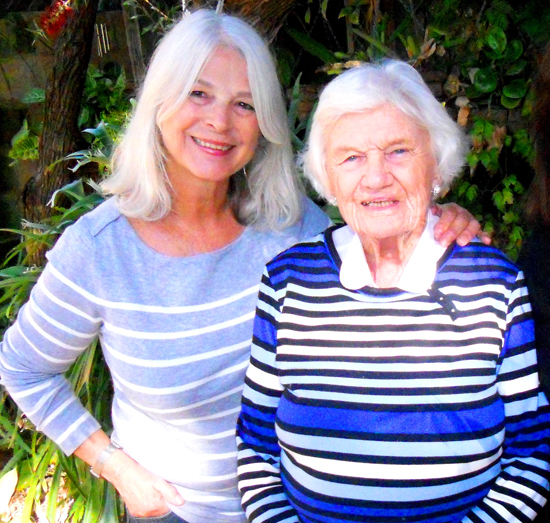Maneesha writes on the importance of being at peace with our parents.
Having spent four years in the UK, in 1974 I bought a ticket back to Australia – and to my parents, who were eagerly anticipating my return. I never made it back.
I stopped for what was to be a cursory visit to a friend’s spiritual master (now known as Osho) in Pune, India. Unexpectedly and completely blown away by the first meeting with him, I tossed my ticket and stayed on…and on and on. The following year my parents briefly visited me at the Osho Meditation Resort; a year later my father left his body. He was the first person to love me unconditionally, and I was left both bereft and full of immense gratitude – feelings that persist to this day.
Over the ensuing 15 years I wrote regularly to my mother. Ours had not always been an easy relationship, but I took to heart Osho’s emphasizing the importance of staying connected to one’s parents. He also quotes the Russian mystic, Gurdjieff Gurdjieff, as saying, ‘Unless you are in good communion with your parents, you have missed your life.’ “If some anger persists between you and your parents, you will never feel at ease,” Osho goes on to say.
“Wherever you are, you will feel a little guilty. You will never be able to forget it and forgive it. Parents are not just a social relationship. It is out of them that you have come. You are part of them, a branch of their tree. You are still rooted in them.
“When parents die something very deep-rooted dies within you. When parents die, for the first time you feel alone, uprooted. So while they are alive, everything that can be done should be done, so that an understanding can arise and you can communicate with them and they can communicate with you. Then things settle and the accounts are closed. Then when they leave the world – they will leave someday – you will not feel guilty, you will not repent; you will know that things have settled. They have been happy with you; you have been happy with them.
“The love relationship starts with the parents and it also ends with them. It comes to a full circle. If somewhere the circle is broken, your whole being will remain uneasy. One feels tremendously happy when one can communicate with one’s own parents. That is the most difficult thing in the world to do because the gap is so big. The parents never think that you are grown up so they never directly communicate with you. They never take account of your freedom and your spirit, your being… no respect. They take it for granted that you have listened to them.
“The gap becomes bigger and bigger. It has to be bridged. If you can bridge your relationship with your mother, suddenly you will feel that the whole earth is bridged. You are more rooted in the earth. If you can bridge your relationship with your father, you are at home with the sky. They are symbolic, representatives of the earth and the sky. And man is like a tree which needs both the earth and the sky.”
Osho, A Rose is a Rose is a Rose
Trying to explain to my mother, for the next fifteen years, what it was like to be living close to an enlightened master and why, in my becoming a disciple or sannyasin, I felt as if I’d come home – finally found my real home – was a challenge. And even more challenging was when, in later years, I began to visit her. I wanted so much for ours to become a loving relationship. It took many visits and subsequent soul-searching for me to see that I was responsible, in part, for the times when we were in conflict; that I was still nursing childhood resentments, and that they fuelled my reactiveness, my wanting to ‘get back at her’. Finally, I admitted to myself, and then to her, that I wanted to be loved by her; that exposing of myself evoked an equally significant revelation from her. In the sharing of our mutual pain, there was, unspoken, forgiveness, and reconciliation.
Fast-forward many years: Our relationship continues to only grow closer and more overtly affectionate. She has been saying for some time that she is ready to die. Her will is in place and, in response to my asking, she has told my siblings and me who she would like to give the eulogy at her funeral, what songs she would like sung (first and foremost being Joni Mitchells’ ‘Both Sides Now’) and where she would like her ashes scattered.

I stayed with her for some weeks during the European summer, and while there one morning I woke with the insistent thought, ‘I must tell Mum that when her body dies her consciousness will be able to see it lying there; the body will be dead but she will be alive, so there is no need to get freaked out!’
An opportunity to say this came some hours later, and I added, “…because you see, Mum, we are not our body or mind; we are the consciousness inside, which is separate from them’.
‘How do you know that?’ she demanded, to which I responded that this was no fanciful theory or exotic eastern belief but that many people have had out-of-the-body experiences, myself included. She immediately nodded; she’s clearly heard or read of such instances. ‘So when my funeral is happening I shouldn’t get cross if something isn’t quite as I’d like it?’ she laughed. But I trust it will be because of the previous conversations we’ve already had.
Of course I would love to be present when she finally leaves her body, to gently guide her into relaxing and letting go – as I explained on this same occasion. She listened attentively, and then nodded her comprehension and agreement….
And it is only now, in our returning to the subject of her leaving her body, that it’s hit me that on my mother’s demise I too shall have died – me as a daughter. The inevitable sadness when she is gone may include grief about the death of my life as a daughter – the daughter who, as a small child, felt she was wrong for not being a boy; the daughter who could never do anything fast enough or well enough to win the praise of her mother; the daughter who longed to be held; the daughter who pretended she didn’t care; the daughter who openly longed for reconciliation and, finally, the daughter who – simply and gratefully – loved and was loved by her mum.
Article by Maneesha
Maneesha is co-facilitator of The Sammasati Support-Person Training 2013




Comments are closed.